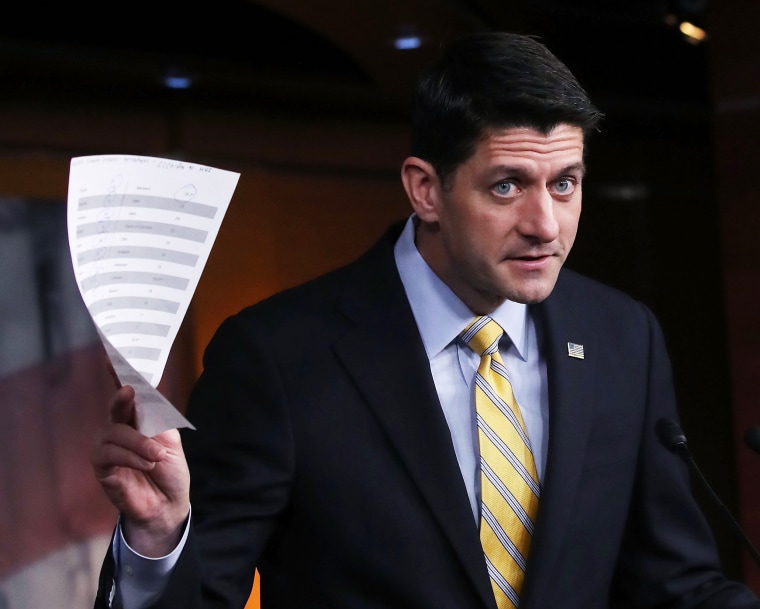Republican members of Congress Thursday armed themselves with a general outline of the party's ideas to replace the Affordable Care Act just as they head home to their districts for the next ten days.
It's a strategic document appropriately timed to help Republicans who might face constituents at town halls angry and worried about losing their health insurance amid their stalled effort to repeal and replace Obamacare.
The 19-page document, released by the House GOP leadership, is thin on specifics but provides general goals for the party on reforming health care policy. But even such a broad outline reveals a party divided on how to approach the issue.
The general outline contains just four main policy objectives for replacing Obamacare. Republicans themselves are not in agreement with all of them, and, as time wears on, they are finding it more difficult to come together on a path forward.
Republicans face the challenge of trying to provide options for the nearly 20 million people who gained insurance under the Affordable Care Act, as many in their party are reluctant to create an entitlement program or spend federal dollars.
The blueprint released by Republican leaders Thursday models ideas championed by House Speaker Paul Ryan. It says a replacement effort would expand the use of Health Savings Accounts, create high risk pools for the uninsured to purchase health coverage, provide a cap on the number of people on Medicaid and allow states to accept a block grant to manage their own program. Central to the plan is the offer of a tax credit to individuals purchasing health care in the individual marketplace.
Related: Trump Administration Tries to Calm Health Insurance Market With New ACA Rule
But the diverse Republican caucus has different ideas on how to move forward and it's unclear how they put together a plan that can garner wide support. Conservative Republicans are reluctant to support any plan that raises taxes or continues the Medicaid expansion, for example.
Rep. Mark Walker, R-N.C., head of the Republican Study Committee, which has the membership of 172 conservative House members, said the outline contains “grounds for concern.”
“Without seeing more details in the proposal, it would be challenging for House conservatives to vote for a plan that would extend Obamacare’s Medicaid expansion, require keeping Obamacare taxes or imposing new ones, and potentially create a new health care entitlement,” Walker said in a statement.
One health care lobbyist who saw Thursday's blueprint said, “All of it is very entertaining, but they are not any closer to finding common ground.”
While they are figuring out how to replace Obamacare, Republicans are also struggling with how to first repeal it. The ACA instituted hundreds of millions of dollars of health-care related taxes to pay for the subsidies Obamacare provides to help people purchase health insurance as well as the Medicaid expansion. If Republicans simply repeal all of the taxes, there would be no way to pay for their own plan.
A spokesperson for House Minority Leader Nancy Pelosi, Drew Hammill, said the plan provides "no details of what they want to do."
"It’s very similar to (Paul Ryan's) Better Way document that has been out for months," Hammill added.
Newly confirmed Health and Human Services Secretary Tom Price traveled to Capitol Hill twice this week to speak with Republicans. The session Thursday morning with House Republicans was described as a meeting “to fill people in” on the latest of Republicans’ top priority.
Related: More Than 12 Million Got Obamacare This Year, Survey Shows
Republicans insist they are making progress but acknowledge that it’s taking longer than expected.
The original timeline to present a plan for repealing Obamacare was January 27 – seven days after President Donald Trump’s inauguration - but Republicans quickly acknowledged that was too ambitious. President Donald Trump said Price would release a plan after his confirmation, which hasn't happened yet. And the goal post was moved to March to unveil a plan but that could be ambitious too.
After years of promising repeal, Republicans are realizing that it’s much more difficult.
“What’s finally sinking into a lot of members is that Obamacare doesn’t go away on one day,” said Rep. Todd Rokita, R-Indiana.
“We didn’t get into this overnight; we’re not going to get out of this overnight,” said Rep. Bill Huizenga, R-Michigan, added.
While this document is a starting point, the finish line is still miles away.
“We're getting closer,” said Rep. Peter King, R-N.Y., but there is no consensus.
But one Republican said that what’s going to be critical for consensus is the administration.
“It is going to require leadership from the White House,” Rokita said.

